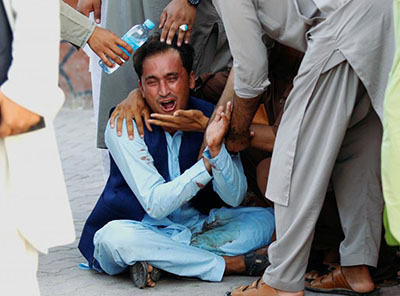By Ayaz Gul
ISLAMABAD — The United Nations says the conflict in Afghanistan killed nearly 1,700 civilians in the first six months of 2018, the highest number recorded in any comparable time period over the last decade.
UNAMA blamed the Taliban for causing 40 percent of the casualties and attributed the remainder to “unidentified anti-government element.”
The midyear report documented 353 civilian casualties, including 149 deaths, from aerial attacks by pro-government forces
The midyear report on civilian casualties released by the U.N. Assistance Mission in Afghanistan (UNAMA) Sunday documented close to 3,500 injured civilians in the same period. However, overall civilian casualties declined 3 percent compared with the same period in 2017.
“We urge parties to seize all opportunities to find a peaceful settlement, this is the best way that they can protect all civilians,” said Tadamichi Yamamoto, who heads UNAMA.
The report noted the number of civilian deaths increased 1 percent to 1,692 and injuries decreased 5 percent to 3,430.
UNAMA acknowledged almost no harm was done to civilians during last month’s unprecedented three-day unilateral Eid cease-fires by the Afghan government and the Taliban. The break in fighting, however, saw two Islamic State-claimed suicide bombings in eastern Nangarhar province resulting in civilian casualties.
“The brief cease-fire demonstrated that the fighting can be stopped and that Afghan civilians no longer need to bear the brunt of the war,” Yamamoto said.
Improvised explosive devices

An Afghan man mourns in a hospital after a car bomb, Jalalabad city, Afghanistan June 16, 2018. The bomb killed 26 on Eid holiday and was claimed by Islamic State. (Photo: Parwiz/Reuters)
The use of improvised explosive devices (IEDs) in attacks by anti-government forces remained the leading cause of civilian casualties, according to UNAMA, which began systematic documentation of Afghan civilian casualties in 2009.
The combined use of suicide and non-suicide IEDs caused nearly half of all civilian casualties, the report said and noted the attacks caused 22 percent more casualties than in the same period last year.
Ground engagements between Afghan security forces and anti-government armed groups and roadside bomb attacks were among other main causes of civilian casualties.
Islamic State-plotted suicide and other attacks caused 52 percent of civilian casualties, mainly in the capital, Kabul, and Nangarhar.
UNAMA blamed the Taliban for causing 40 percent of the casualties and attributed the remainder to “unidentified anti-government element.”
Aerial attacks
The midyear report documented 353 civilian casualties, including 149 deaths, from aerial attacks by pro-government forces, showing a 52 percent increase from the same period in 2017.
“The mission attributed 52 percent of all civilian casualties from aerial attacks to the Afghan Air Force, 45 percent to international military forces, and the remaining 3 percent to unidentified pro-government forces,” the report said.
The United States under President Donald Trump’s strategy to force the Taliban to the negotiating table has increased and expanded airstrikes against insurgents in Afghanistan.
The Taliban, however, rejects the idea of engaging in any reconciliation process with Kabul as long as U.S. and NATO forces are stationed in the country and demands direct talks only with the U.S. calling it the main adversary in the 17-year-old war.
Washington rejects the insurgent demand for bilateral talks but it has not ruled participation in a peace process initiated and led by the Afghan government.
In its civilian casualty midyear report, UNAMA also noted with concern rising attacks on election-related activities in Afghanistan ahead of long-delayed parliamentary and provincial council elections scheduled for October 20.



